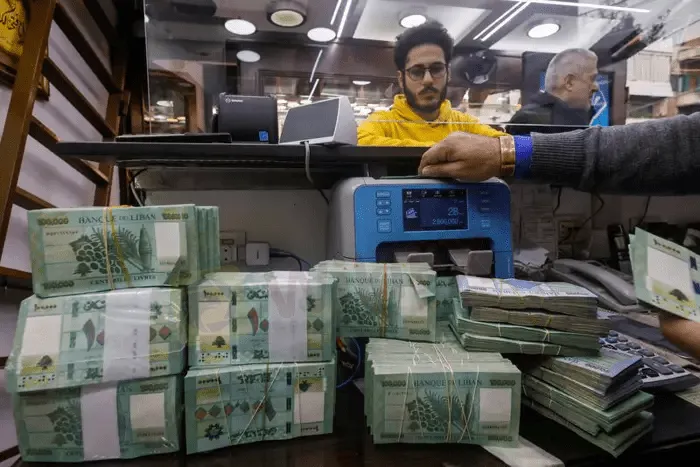简体中文
繁體中文
English
Pусский
日本語
ภาษาไทย
Tiếng Việt
Bahasa Indonesia
Español
हिन्दी
Filippiiniläinen
Français
Deutsch
Português
Türkçe
한국어
العربية
Lebanon to sell unlimited US dollars to prop up collapsing pound
Abstract:Lebanon’s central bank will begin selling unlimited amounts of U.S. dollars in a bid to halt the spiralling devaluation of the Lebanese pound, Governor Riad Salameh said on Tuesday.

Salameh set a new rate for Sayrafa, the central banks exchange platform, at 90,000 Lebanese pounds per dollar on Tuesday. He set the rate at 70,000 on March 1 but it has steadily crept up, trading at 83,500 on the platform on Monday.
The Lebanese pounds parallel market rate weakened from roughly 121,000 to the U.S. dollar on Tuesday morning to 140,000 by the afternoon, prompting residents to briefly seal off roads in anger over their declining purchasing power.
The pound has lost more than 98% of its value since the economy began unravelling in 2019. The central bank revalued the pound officially from 1,507.5 to 15,000 per U.S. dollar in February but it has traded at a much lower and varying rate on Sayrafa.
Tuesdays move came with the approval of the caretaker premier and caretaker finance minister and aimed to “limit the devaluation of the Lebanese pound in the parallel market,” Salameh said.
Those willing to trade could use Grade A exchange houses or banks which lift their strike, he said. Lebanese banks resumed a strike last week to protest against legal measures taken against them.
The pound began rising in value on the parallel market immediately after the decision was announced.
Unifying multiple exchange rates is one of several steps sought by the International Monetary Fund for Lebanon to clinch a $3 billion aid package that would help it emerge from the meltdown.
But as Lebanon approaches the one-year mark since it signed a preliminary deal with the IMF, residents are still dealing with a dizzying array of exchange rates.
Salameh said in February that Lebanon still had about $10 billion in foreign currency reserves. The country had more than $30 billion in FX reserves when the crisis began.

Disclaimer:
The views in this article only represent the author's personal views, and do not constitute investment advice on this platform. This platform does not guarantee the accuracy, completeness and timeliness of the information in the article, and will not be liable for any loss caused by the use of or reliance on the information in the article.
Read more

The Dark Side of Trading Gurus: Are You Following a Fraud?
Across social media, YouTube, and countless online forums, self-proclaimed trading ‘gurus’ promise to share their winning strategies for a price. These so-called experts claim to have cracked the code, offering courses, investment tips, and mentorship schemes that guarantee success. However, in reality, many of them are little more than sophisticated scammers, preying on the financial aspirations of their followers.

INFINOX Partners with Acelerador Racing for Porsche Cup Brazil 2025
INFINOX has teamed up with Acelerador Racing, sponsoring an Acelerador Racing car in the Porsche Cup Brazil 2025. This partnership shows INFINOX’s strong support for motorsports, adding to its current sponsorship of the BWT Alpine F1 Team.

The Daily Habits of a Profitable Trader
Every professional trader follows a structured approach to ensure they are well-prepared, disciplined, and able to seize opportunities with confidence. Whether you are a seasoned investor or an aspiring trader, adhering to a robust daily checklist can significantly enhance your performance. Use this checklist to check if you are a qualified trader

Authorities Alert: MAS Impersonation Scam Hits Singapore
MAS scam alert: Scammers impersonate officials, causing $614K losses in Singapore since March 2025. Learn how to spot and avoid this impersonation scam.
WikiFX Broker
Latest News
TradingView Brings Live Market Charts to Telegram Users with New Mini App
Trump tariffs: How will India navigate a world on the brink of a trade war?
Interactive Brokers Launches Forecast Contracts in Canada for Market Predictions
Authorities Alert: MAS Impersonation Scam Hits Singapore
Stocks fall again as Trump tariff jitters continue
INFINOX Partners with Acelerador Racing for Porsche Cup Brazil 2025
Regulatory Failures Lead to $150,000 Fine for Thurston Springer
April Forex Trends: EUR/USD, GBP/USD, USD/JPY, AUD/USD, USD/CAD Insights
March Oil Production Declines: How Is the Market Reacting?
Georgia Man Charged in Danbury Kidnapping and Crypto Extortion Plot
Currency Calculator







